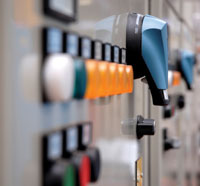
Posted to News on 23rd Nov 2018, 00:00
The benefits of bespoke motor control centres
Pat McLaughlin of Boulting Technology discusses how a made to measure motor control centre (MCC) can benefit both commercial and industrial operations.

The ceiling of the Sistine Chapel was commissioned by Pope Julius II and painted by Michelangelo between 1508 and 1512. The nature of the space required Michelangelo to paint from a unique system of platforms. In the five centuries since its completion, Michelangelo’s masterpiece has been surprisingly durable. Resilience and adapting to a space are two requirements that art and industry have in common, particularly in the case of electrical equipment.
A motor control centre is an assembly of one or more enclosed sections in a metal cabinet containing motor control units with a common power bus. It can also include variable frequency drives, programmable logic controllers and metering and can act as the service entrance for the building’s electricity.
Power distribution in large commercial and industrial applications can be complex, but with the help of an MCC, organisations can simplify the process. The main purpose of a motor control centre is to protect valuable electrical equipment. Using an MCC with the wrong specification can damage components, which may result in downtime. For this reason, it is important to purchase the right MCC to safeguard the rest of the system.
Possibly the most important factor to consider when purchasing an MCC is the space and environment that it will go into. If the location of the MCC isn’t considered early on, it can be tricky to get a standard, off the shelf MCC to meet the requirements of the remaining space.
A bespoke MCC is the best way to get around spatial restrictions. A company can specify its technical requirements including how many starters are necessary and the dimensions of the available space. The MCC manufacturer can then create a suitable proposal. Bespoke MCCs designed and built by Boulting Technology can fit into almost any space through innovative L-shaped, U-shaped and back-to-back designs. A genuine back-to-back MCC is often more cost-effective as well as having half the footprint, which makes a genuine difference, especially when space is limited.
Electrical equipment design is a complex process and each production space has different requirements. While back-to-back MCCs may be most suitable for some environments, a U-shaped MCC could work better for others. Only an experienced consultant will be able to provide an accurate recommendation of the best MCC design for the space at hand and process specific requirements.
As well as meeting spatial requirements, bespoke MCCs can be designed to the exact technical demands of a company’s processes without being limited to the standard options given by the manufacturer. By working with an independent MCC specialist, companies can mix and match components from different manufacturers instead of having to go for a predesigned standard model.
One design feature that can make MCCs easier to maintain and replace is the option of withdrawable starters. The benefits of this can be reaped in facilities that run numerous processes simultaneously, for example in water facilities or an oil or gas company.
A bespoke MCC can also be designed to suit the conditions of its operating space. Some environments can be much harsher so components with higher ingress protection (IP) ratings may be required to safeguard the equipment from foreign bodies, humidity or other environmental factors.
Because MCCs have a lifespan of around 25-30 years, a bespoke design must be made to meet all future challenges. In the case of older MCCs, it is possible to replace or upgrade panels to meet new specifications, although commissioning a new one might often be a wiser decision. In an ideal situation, an MCC should be equipped for future challenges from the onset.
MCCs are crucial in simplifying power distribution. While an off-the-shelf motor control centre might be suitable for many applications, a bespoke MCC offers a flexible footprint, better use of space and suitability for its environment. Just like Pope Julius II commissioned Michelangelo to undertake a unique project, purchasing a bespoke MCC may be the key to a resilient design, perfect for your space.
Boulting House, 4 Hargreaves Court
Staffordshire Technology Park
ST18 0WN
UNITED KINGDOM
+44 (0)1785 245466








